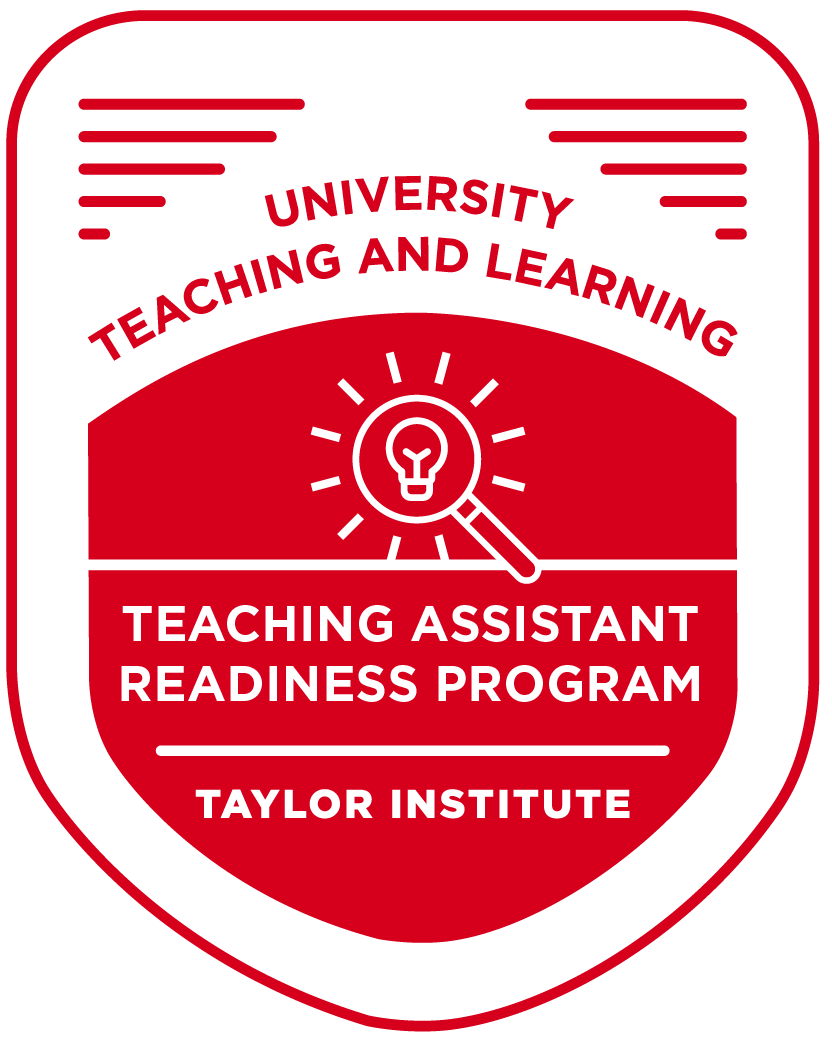
Teaching Assistant Readiness Program
Earn a badge for completing the Teaching Assistant Readiness Program (TARP) offered by the Taylor Institute.

Program overview
The Teaching Assistant Readiness Program (TARP) is designed specifically for University of Calgary graduate teaching assistants (GTAs) across all academic units. This program is not intended as a replacement for existing faculty and/or department specific GTA training.
TARP is an immersive 6-week online program that combines evidenced-based strategies with practical teaching and learning skills. Participants in this program will be part of a cohort that explores current teaching and learning research from a student-centered learning and inclusive teaching practices lens. During five interactive workshops, participants will develop practical teaching skills, identify research-informed strategies to use in their teaching contexts, and connect with peers from multi-disciplinary teaching environments. Attendance is required at each workshop with participants completing a one-page practical application worksheet after each workshop. The TARP program concludes with each participant submitting a final reflective learning summary.
Program details
This badge program is open to all graduate students and post-doctoral scholars at the University of Calgary. In order to receive the badge, you must register and participate in all five required workshops, as well as complete three out of the four one-page practical applications and a mandatory final reflective learning summary.
Participants will be able to:
- Identify and choose classroom management strategies that promote positive Graduate Teaching Assistant (GTA) and student relationships in various course environments.
- Evaluate and apply appropriate assessment methods to measure student learning.
- Analyze and differentiate teaching beliefs critically to understand their importance on one’s own teaching practice.
- Synthesize and create effective strategies to foster ongoing professional development in teaching and learning.
- Participate and reflect in a collaborative community for GTAs to promote teaching and learning.
Required workshops and topics
In this workshop, participants will explore classroom management strategies such as planning effective office hours, asking effective questions and responding to student questions, facilitating engaging student discussions in online and in-person learning environments, etc. We will explore these topics under the lens of inclusive teaching practices and universal instructional design.
- Facilitator: Lorelei Anselmo, MEd
- Method of delivery: Online synchronous - Zoom
- Date: Tuesday, May 27, 2025 from 10 – 11 a.m.
By the end of this workshop, participants will be able to:
- Recognize strategies that create equitable and inclusive classrooms/labs/tutorial sessions.
- Use classroom management strategies to promote positive TA-student relationships.
- Identify strategies to facilitate effective student discussions in different learning environment.
In this workshop, participants will explore key pedagogical aspects of assessment and grading in student-centered learning environments. We will discuss the importance of formative feedback and summative assessments along with a brief overview of rubrics and their use in grading. Strategies for providing feedback on students’ assignments will be discussed so that participants can provide meaningful and effective feedback to help their students succeed in the course.
- Facilitator: Lorelei Anselmo, MEd
- Method of delivery: Online synchronous
- Date: Tuesday, June 3, 2025 from 3 – 4 p.m.
By the end of this workshop, participants will be able to:
- Discuss the importance and role of formative feedback and summative assessments
- Select appropriate assessment methods to evaluate student learning;
- Use an assessment rubric to provide feedback and measure student performance; and
- Explore methods to provide effective feedback to students.
Teaching Assistants (TAs) are critical members of the teaching team. They bring to their position a wide variety of experience and backgrounds and contribute in meaningful ways. Creating a climate of mutual respect and reciprocity for each other while working as partners with your instructor can have a positive impact on teaching and learning goals.
- Facilitator: Lorelei Anselmo, MEd
- Method of delivery: Online synchronous
- Date: Tuesday, June 10, 2025 from 10 – 11 a.m.
By the end of this session, participants will be able to:
- Discuss strategies to develop a positive partnership with your professor
- Explore effective ways of enhancing communication with your instructor
- Create a climate of feedback and reciprocity that supports your mental well-being
In this workshop, participants will explore topics related to their professional development as a TA. This workshop will provide them with an opportunity to meaningfully reflect on their TA experiences; discuss their emerging teaching practices; identify teaching-related goals and explore available campus resources to promote further development.
- Facilitator: Lorelei Anselmo, MEd
- Method of delivery: Online synchronous
- Date: Tuesday, June 17, 2025 from 10 – 11 a.m.
By the end of this workshop, participants will be able to:
- Recognize strategies to engage in critical reflection
- Discuss their TA experiences with peers and colleagues
- Explore their emerging teaching practices
- Develop awareness of campus resources and available programming offered by TI
This workshop is an introduction to generative artificial intelligence for graduate teaching assistants. Participants will explore how to ethically teach with and use generative artificial intelligence tools in their courses. Participants will actively engage through interactive discussions and practical activities, enhancing their understanding of AI fundamentals and its applications in their courses.
- Facilitator: Lorelei Anselmo, MEd
- Method of delivery: Online synchronous
- Date: Tuesday, June 24, 2025 from 10 – 11 a.m.
By the end of this workshop, participants will be able to:
- Identify ethical principles of AI and education and its relevance to challenges and opportunities.
- Investigate generative AI tools and their applications in teaching.
- Collaborate with peers to brainstorm and discuss innovative ways to integrate AI in teaching scenarios.
- Reflect on the ethical aspects of AI technology in classroom settings through structured group discussions.
To earn the TARP badge, participants must attend four out of the five workshops and submit four out of five completed practical applications. Participants will create a final reflective summary, comprised of what they've learned and their experiences in the program. This will be delivered as a one-page text document equivalent to 150-250 words, or a 2-3 minute audio or video recording.
Instructor
Lorelei Anselmo, MEd
Teaching Supports Team Lead
